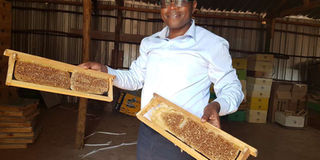Premium
Where are the bee farmers?

Jackson Masesi in his Bee Care Apiaries Ltd workshop in Kilimambogo. He exports about 118,000 tonnes of wax every year.
PHOTO | RACHEL KIBUI | NATION MEDIA GROUP
What you need to know:
- Jackson Masesi has built a one-stop shop for bee all the products and equipments, with the farmer exporting beewaz to the US
- Bee Care is the first Kenyan company allowed to export wax to the European Union, thanks to Masese’s passion for bees and bee products and support from the State Department of Veterinary Services.
- He spent Sh100,000 looking for the wax from across the country but barely got enough, prompting him to cross the border to Tanzania.
Pearched on the foot of Mt Kilimambogo, on the outskirts of Thika, is a beauty; an opportunity and a minter.
The mountain, in the heart of Ol Donyo Sabuk National Park, is one of the biggest attractions in the region and so is Mr Jackson Masesi’s innovation. Mr Masesi, an entrepreneur, has turned his company into a one-stop shop that deals with all matters bees.
Mr Masesi, the founder of Bee Care Apiaries Ltd, ushers us into the premises where workers are making about 100 beehives.
Masese has decorated his office with wax of different shapes, colours and sizes.
On the table are equipment like smokers and a collection of tens of honey brands from different countries.
“I like collecting bee products. When I fly out of Kenya, I don’t look for chocolate. I come with honey in order to compare it with my products and those of other companies,” Masese says.
Bee Care is the first Kenyan company allowed to export wax to the European Union, thanks to Masese’s passion for bees and bee products and support from the State Department of Veterinary Services.
The accountant initially worked for Kenya Nut Company before the bee bug stung him as he attempted to help his wife engage in business.
“I started in 2004 using Sh9,000 to buy three buckets of honey and packaging materials,” says Masesi, who has 250 hives in Makueni and Machakos counties.
“I had known where to get packaging materials and was therefore able to negotiate for fair prices.”
He sold the first stock mainly to to friends.
Marketing
Gradually, Masesi graduated to looking for orders and even secured one for the Armed Forces Canteen Organisation in Eastleigh, and other outlets, including supermarkets.
At the time, he was operating as Inento Bee Products East Africa, and had one worker, who was in charge of marketing.
Sometime in 2006, the business faced financial problems that almost led to its collapse.
To make matters worse, Masesi lost his job the same year.
“I took a risk by selling the only land I had for Sh400,000 to raise capital,” he says.
He engaged his former clients who bought his products. And as the business stabilised, Masesi toyed with the idea of exporting the products.
“I came across a friend’s magazine in 2011 and saw an advert that read: ‘We are global beewax buyers’,” he says.
Though he had no idea of where to get wax and how to export it, Masesi, contacted the advertiser by email.
The potential client landed in Kenya from the US three months later to see Masesi’s wax firm.
Export
However, he had only a small room, with about three kilogrammes of crude wax.
On the day the guest arrived, Masesi asked his wife and brother to pack honey “in order to make the place appear busy”.
“I later took him to small-scale honey producers in Mwingi, Embu and Kitui counties and convinced him that I would get the wax he needed. All I wanted was to win his trust,” says Masesi, who has built his expertise in apiculture through research and attending workshops.
The client ordered 18 tonnes of wax, which Masesi promised to deliver.
A few weeks after the client went back to America, he sent Masesi Sh7 million.
He spent Sh100,000 looking for the wax from across the country but barely got enough, prompting him to cross the border to Tanzania.
“It was a miracle that I could get and ship all the wax he had ordered. This opened my financial and business gates,” he says.
Crude wax export ban
Masesi would later get contacts with many more clients in US, Germany, the EU and other regions.
In 2015, the export of crude wax to the EU was banned.
He, however, worked with a potential client and the veterinary department and got listed to export to this lucrative market.
Masesi now exports crude wax to the US, Germany, Britain and Spain.
“I export about 100,000 tonnes of wax from Tanzania and about 18,000 from Kenya every year,” the businessman says.
“I have not contracted farmers but they sell the wax and honey to me on first-come-first-served basis.”
Employment opportunity
One must have a business permit from the county government and an export licence and health certificate to be in the export business.
Locally, Masesi is working with more than 3,000 small-scale bee keepers from whom he buys honey and crude wax.
While wax is his main business, honey comes second, but is almost being overtaken by beekeeping equipment, especially the hives he makes.
Masesi’s firm has 18 permanent employees and engages many casuals during the peak wax production season, which runs from July to September.
Peter Kagio, an apiculture and sericulture lecturer at Egerton University, says while many people ignore apiculture, it has very many opportunities.
Kagio isolates honey, equipment, hives and wax as among the business opportunities across the value chain, which he adds has not yet been fully exploited.
He says people should take advantage of the growing beauty, candle and other industries whose raw material is wax, and venture into apiculture.





